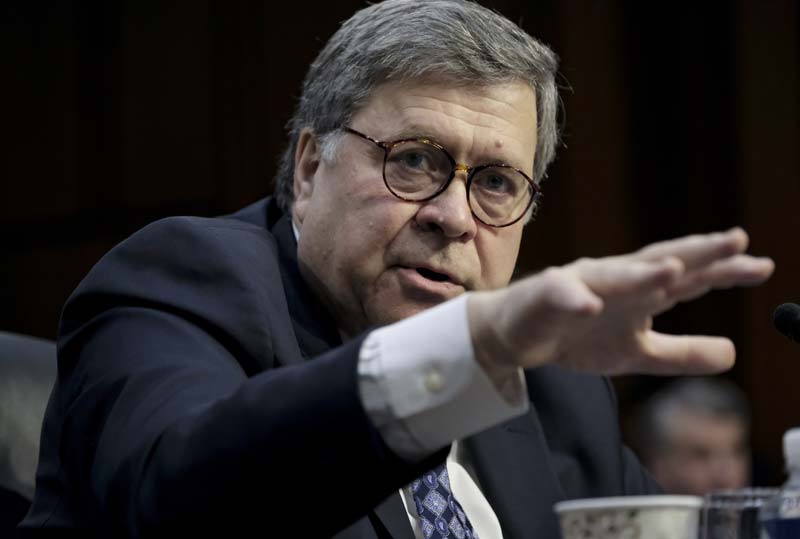 Bonnie Jo Mount for The Washington Post
Bonnie Jo Mount for The Washington Post
Lawmakers and commentators have expressed consternation over Barr's refusal to commit to make Mueller's report public. But Barr is absolutely correct. It's not Mueller's job to prepare a public report, and there's no reason to expect that whatever report he does prepare would necessarily be released.
Under the old independent counsel statute, authorized in the 1978 Ethics in Government Act, the independent counsel was required to write a report to Congress if he or she found any evidence of potentially impeachable misconduct.
The most famous - or infamous - example of this was Kenneth Starr's voluminous and graphic report about the Bill Clinton/Monica Lewinsky affair. Public backlash over the excesses of Starr's report arguably contributed to Congress's decision to let that law expire in 1999.
We now have the Department of Justice special counsel regulations under which Mueller operates. Pursuant to those regulations, Mueller is much more like a typical federal prosecutor. Although he has a great deal of day-to-day autonomy, he is treated like a U.S. attorney, subject to all Justice Department rules and regulations.
Federal prosecutors speak to the public through the cases they bring. Mueller has already provided a great deal of information through his indictments of Russians involved in the hacking of top Democrats' email accounts and the social media campaign to sway the 2016 presidential election. Pleadings filed in other cases have revealed additional details concerning what Mueller has uncovered, and more indictments or plea deals may be coming.
But prosecutors don't write public reports, particularly about cases they decline to prosecute. In part this is because of federal rules requiring that matters occurring before a grand jury remain confidential. Grand jury secrecy exists for important reasons, including to safeguard the integrity of the investigation and to protect the privacy of individuals who might be investigated but ultimately not charged. It continues to apply even after an investigation is concluded, and violations may be punished by contempt of court.
Prosecutors may write an internal memorandum about a case they ultimately decline to pursue, but those are not for public consumption. The special counsel regulations embody this standard Justice Department practice. They require the special counsel to provide the attorney general with a "confidential report" explaining his prosecution or declination decisions. There is no provision for making that report public.
A separate section of the regulations requires the attorney general to report to Congress upon the appointment or removal of a special counsel and, upon the conclusion of the investigation, about any instances in which the attorney general overruled proposed actions by the special counsel.
The regulations provide that the attorney general may decide that release of "these reports" - from the attorney general to Congress - would be in the public interest. But all other reports, including any report from the special counsel himself, may be disclosed only as allowed by general Justice Department policy and applicable law. Typically, that would mean a report describing a grand jury investigation such as Mueller's would not be released.
It's possible that any report completed by Mueller ultimately will find its way into public view. Congress may be able to subpoena it, or a court may approve the release of grand jury material. Or perhaps a heavily redacted version will be released, scrubbed of any grand jury information. But regardless, whatever is released may prove to be unsatisfying. There's a much broader universe of potential misconduct that may be important for the public to know but does not rise to the level of a criminal offense.
Mueller has a narrow mandate and need explain only his decisions to bring or not bring specific criminal charges. There's no guarantee that whatever report Mueller does generate will address the full range of criminal and noncriminal misconduct in Starr-like detail.
Over the past 18 months, much of the public has pinned a lot of hope on the Mueller investigation. In the midst of a government that often seems dysfunctional, it appears to be an example of something that is being handled professionally and appropriately. Clearly there is a tremendous public interest in the subject matter of Mueller's probe. But it's a mistake to rely upon a criminal prosecutor to answer all of the public and political questions implicated by President Donald Trump's actions.
That's why congressional oversight is so important. Investigating executive-branch misconduct to inform the public and take any appropriate steps in response is the responsibility of the coequal legislative branch. The upcoming House Oversight Committee hearing featuring public testimony by former Trump attorney Michael Cohen will likely be the first of many such hearings now that the Democrats control the House. That's as it should be: A broad public investigation into all things Trump and Russia is Congress's job, not Mueller's.
Every weekday JewishWorldReview.com publishes what many in the media and Washington consider "must-reading". Sign up for the daily JWR update. It's free. Just click here.
(COMMENT, BELOW)
Eliason teaches white-collar criminal law at George Washington University Law School.
Previously:
• 01/16/19: Don't subpoena Trump's interpreter


 Contact The Editor
Contact The Editor
 Articles By This Author
Articles By This Author